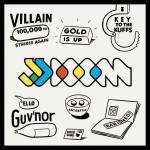
JJ DOOM Key to the Kuffs
(Lex Records)
This is not the new DOOM collaboration we’d been hoping for, but considering how much his output has dried up over the past few years, fans will be grateful for anything new – even this brief and uneven smattering of new verses (DOOM appears on just 9 out of 15 tracks). The guy put out four of the best rap records of a decade in 2003 & 2004, but you’d have to be optimistic to still see Key to the Kuffs as a pit stop on the way to the promised Ghostface Killah collab or a proper Madvillainy 2. Understandable disappointment aside, Key to the Kuffs remains worth checking out, as DOOM’s partnership with offbeat producer Jneiro Jarel provides enough tangential ideas to pique interests again.
But it is a very strange record, even by DOOM standards. There’s almost none of the comic-book antics and samples that dominate his previous work; instead the main thing people will remember about Key to the Kuffs is, bizarrely, that it’s an album about, well, the British? The result of green card woes caused by DOOM’s British passport (he was born in London but grew up in New York) is that he’s spent the past couple of years stuck in the UK, away from his wife and kids. These circumstances are only alluded to, so it’s weird to hear him rapping about British slang and patois. The record is filled with oddball snippets of English chatter, and it also features guest spots from Beth Gibbons and Damon Albarn (which are bafflingly quiet to the point that they barely register). Guv’nor has him repeating “Allo guv’nor!” in his best Sarf Landan accent, and there’s even a reference to My Big Fat Gypsy Wedding, as if he’s deliberately avoiding making sense across the pond.
As ever, his rhymes are strewn with esoteric references (“he been flippin’ beats since Casio Bossa Nova” on Bite the Thong is a personal favourite) and show-offy wordplay (on “Rhymin Slang” he knots together damn near every syllable) - he deserves props if only for fitting the word "Eyjafjallajökull" into his flow (Guv'nor). But there are flaws on a subtle technical level. When I wax lyrical about my love of Madvillainy I go on about the unfathomable tautness of his assonance and metre, how effortlessly symmetrical his delivery is on every single line. While that sets a sky-high standard, Keys to the Kuffs has a few too many stop-starts and ripped seams, and DOOM’s flow often seems deliberate rather than intuitive, which results in a dearth of quotable lines.
On Winter Blues he gets sensual, even breaking out of his monotone for a sung outro. The hook is weak, though – the line “Make you feel like – like twelve again” sounding like a placeholder never erased. But then elsewhere, his sense of irony is completely on point, particularly on closer Wash Your Hands, which manages to work as both an OCD tirade against bad hygiene and a send-up of commercialised rap – I find the idea that DOOM “brings his own mug to the bar” pretty hilarious, and he’s always convincing in his scorn for the mainstream.
I’ve been neglecting Jarel’s role in all this, perhaps because he doesn’t project much of his own personality into the tracks. He’s responsible for some underrated abstract rap, (particularly Craft of the Lost Art under his Shape of Broad Minds moniker), and on Key to the Kuffs he showcases a broad range of tools, but I can’t escape the feeling that he’s working in Madlib’s shadow. The way he makes hip-hop sound collages is straight from Madvillainy’s book – but it doesn’t live up because there’s a discrepancy between the moods of his beats and DOOM’s themes. Where for instance, does Jarel emulate the paranoia of GMO or Wash Your Hands?
He seems more eager to challenge DOOM, for instance the swerving uptempo of lead single Banished prompts the rapper to interject “Not to interrupt / But anybody else notice time speeding up?” Jarel also spits a clever verse on Dawg Friendly, but there’s little he can do to make up for the lack of verses from his partner.
On my final listen of the record before I typed up my review, I realised that DOOM had second-guessed my reaction all along. Although Bite The Thong is primarily a song in which he grapples with the idea of “going pop” and how much easier an unlikely major-label backing would make things, there’s a darker undercurrent – “We the wrong ones so don’t even ask / It’s hard enough trying to breathe up in this mask”. That’s the problem – he’s having to try harder. He’s trying to confound high expectations. And whatever circumstances have bottlenecked his output recently, he’s nevertheless making some fascinating and dense music. In spite of my qualms he’s given us a lot to unpick, even if the record isn’t as cohesive as it ought to be.
27 August, 2012 - 09:21 — Stephen Wragg